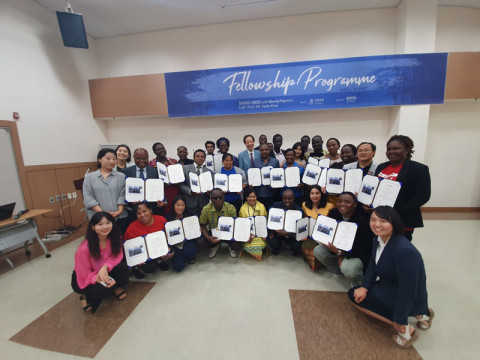
GCED Basic Search Form
Quick Search
أنت هنا
الأخبار

Hosting key figures in the education sector, intensive training has been provided for 25 participants from 12 African and 6 Asia-Pacific countries from June 3 to July 29, 2019. Co-sponsored by UNESCO Headquarters and the Korea International Cooperation Agency (KOICA), this programme is into its 13th year of implementation aiming to enhance their capacities and to foster critical perspectives on education development. The training objectives for this year’s programme were to facilitate the development of basic education by building capacity of key educators, to encourage participants to gain a deeper understanding and reflective perspectives on educational development, and to raise knowledge and capacity on Global Citizenship Education (GCED) and girls’ education.
During the 57 days of stay in Korea, the participants attended various sessions including lectures and study visits which can be largely divided into two parts: policies and practices for educational development and global citizenship education. As for education development, lectures were mainly on topics such as education and national development, educational policies in Korea, curriculum and evaluation, and the use of computer technology in education. A series of ICT training, especially, equipped them with computer skills enough to produce educational materials for their uses depending on each local context. For the second part, topics such as sustainable development goals, conceptual framework and pedagogical principles of GCED, and girls’ education were also discussed during the lectures.
Field visits to different levels of schools and such organizations as National Human Rights Commission of Korea and Seoul Foundation of Women and Family gave the participants a variety of experiences and learning. While hearing the briefings directly from and having in-depth discussions with the officials in the organizations, the participants were able to deepen understanding about the issues of education and sustainable development. Korea DMZ Peace-Life Valley, in particular, provided an opportunity to look beyond the cultural differences into the harmony of nature and human beings and to contemplate the challenges we are facing as global citizens.
2019 UNESCO/KOICA Joint Fellowship Programme, all in all, allowed the participants to strengthen their global competency and to renew their motivation as educators. On the last day, giving a presentation on their own action plans made by synthesizing what they have learned from the lectures, discussions, and visits, every participant took a step forward to implement their initiatives and to produce the ripple effect in their home countries.
